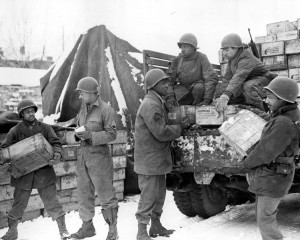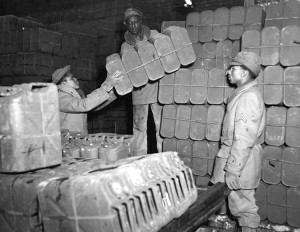African American History: Red Ball Express
Thursday, February 23rd, 2017February 23, 2017
In another feature of Black History Month, today we look at the Red Ball Express of World War II (1939-1945). The Red Ball Express was a massive trucking system created by the United States Army Transportation Corps. The Red Ball Express carried supplies to Allied armies as they pushed across France toward Germany in 1944. Most of the Red Ball Express truck drivers and mechanics—75 percent—were African Americans. At that time, the U.S. Army operated under a policy of racial segregation (separation), and most African Americans in the Army were forced to serve in noncombat roles. Red Ball referred to an old railroad term for express shipping.

U.S. Army troops load supplies on a Red Ball Express truck bound for the front lines in late 1944. Credit: Army Transportation Museum
By August 1944, World War II had left the French railway system largely destroyed. As a result, Allied forces in France relied heavily on trucks for the delivery of supplies. Combat troops needed huge quantities of food, ammunition, medicine, gasoline, and other supplies.
Starting from Normandy, in northwestern France, the Red Ball Express traveled to and from the front lines. Road signs and markers guided the way. Mechanics and maintenance crews worked around the clock. Special rest stops provided exhausted drivers with meals and places to sleep. In less than three months, around 6,000 Red Ball Express vehicles delivered more than 400,000 tons (360,000 metric tons) of vital supplies to the Allied armies.

U.S. Army troops prepare a Red Ball Express shipment of badly needed gasoline in the autumn of 1944. Credit: Army Transportation Museum
In November 1944, the Allies opened the Belgian port of Antwerp, which earlier had been occupied by the Germans. The Allies then brought their supplies through Antwerp, because it was closer than Normandy to the front lines. As a result, the Red Ball Express was no longer needed. More than 200,000 African Americans served in Europe during World War II. More than 90,000 of these soldiers served in the Red Ball Express and other areas of combat service support.


